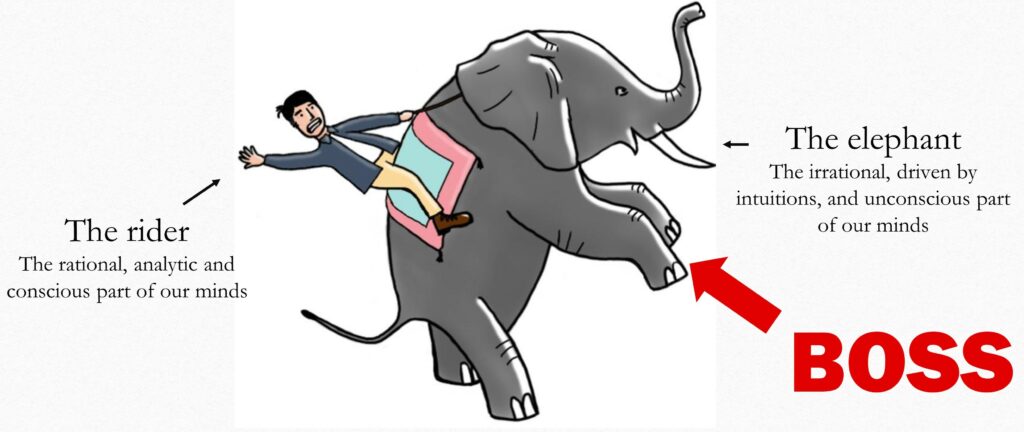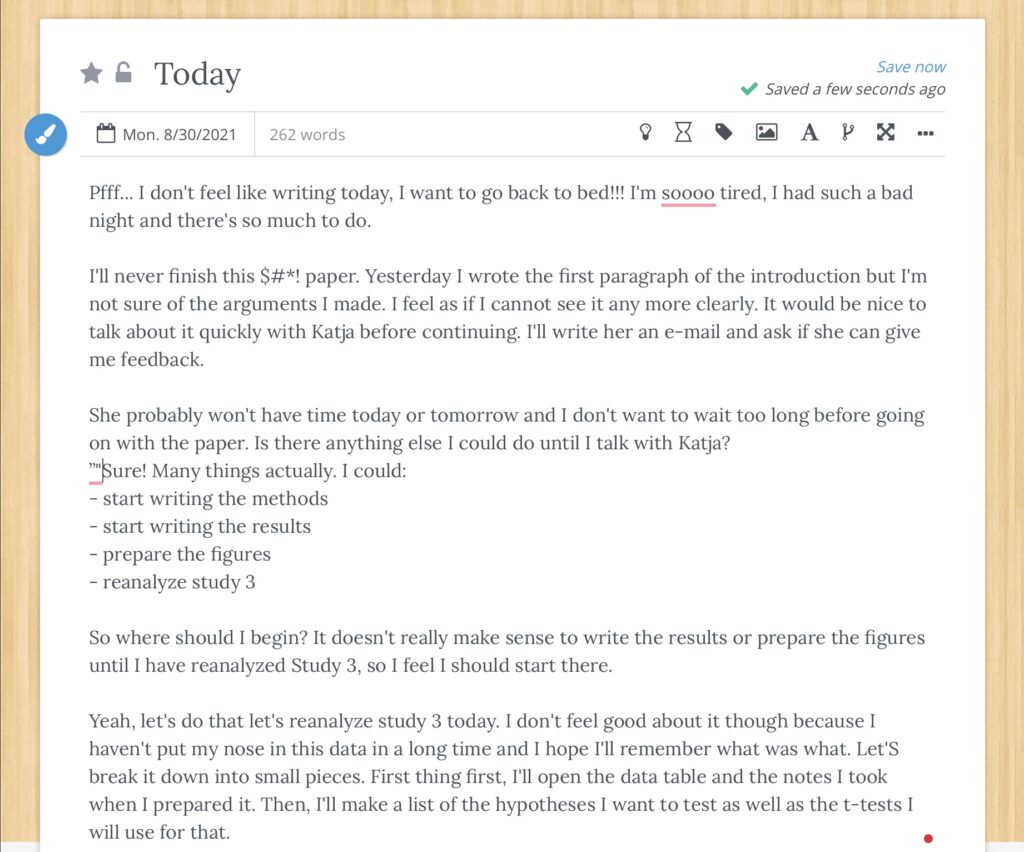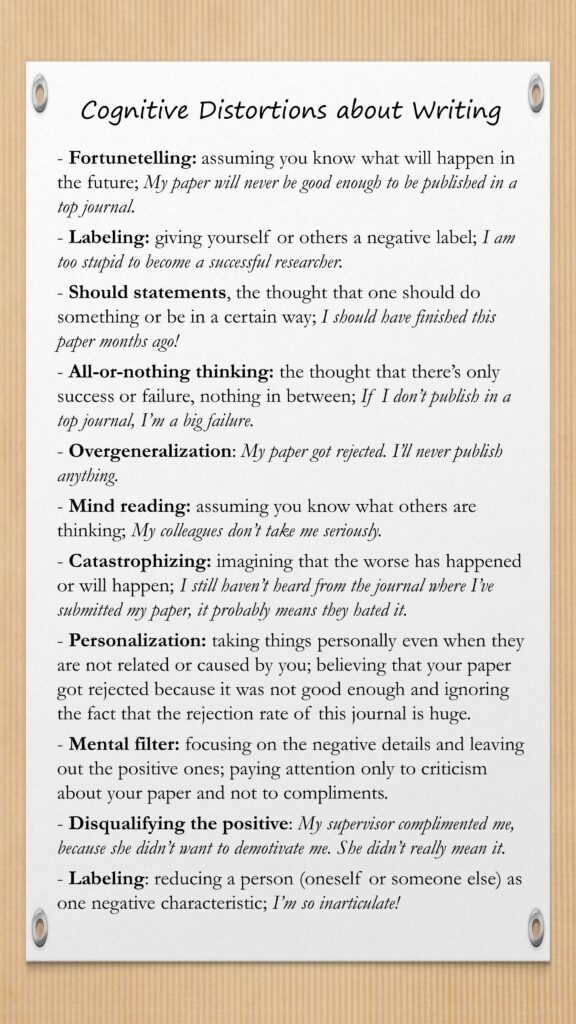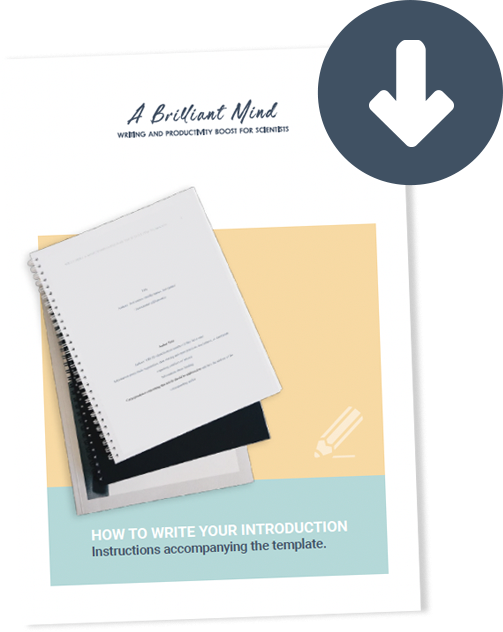Every scientist knows that writing is a priority task, or at least that it should be. Yet many Ph.D. students, postdocs, and professors (yes, professors!) struggle with writing and keep on putting it off.
This article is for scientists who want to stop twirling around their blank pages and get some solid writing done. I explain why it’s so hard to start writing and then describe 12 practical ways to overcome this problem.
Why is it so difficult to start writing?
Have you ever wondered why you spend so much time doing everything except what you know you should be doing?
Confessions of a serial online shopper: Writing vs measuring spoons
My favorite activity when trying to avoid writing a paper is online shopping. I buy clothes, books, shoes, sports equipment, kitchenware, hair products… mostly things I don’t need. I order them, pick them up at the post office, bring them home, realize I don’t really want them, and return to the post office to send them back. This is a huge waste of time for me, the Zalando and Amazon teams, and a big spit in the face of the environment. I know it would be 1000 times better to write the damn paper, but as I sit in front of my blank page, my mind keeps returning to the pack of 6 steel measuring spoons I’m in desperate need of. Why this sudden attraction (besides the fact that the spoons are magnetic)?
Procrastination: An elephant affair
My mind is not rational. And neither is yours nor anyone else’s. Our minds are like elephants that carry a rider on their back. In this metaphor, the elephant stands for our automatic, intuitive, habitual thoughts and behaviors, while the rider represents the more analytical and reasoned part of our mind. Psychologists have shown that most of our behaviors are not rational decisions made by the rider but are emotionally driven by what our elephants want to do. And most elephants often don’t feel like writing, so we keep putting it off.

Our elephants don’t like to write for many reasons. For example, they may feel overwhelmed by the task, not knowing where to start or what to do. Then they remember how easy and fun it is to shop online (or watch the news or linger on social media), and we switch to Amazon, YouTube, or Facebook.
Elephants are not bad; they just want to enjoy the moment. But when that’s inappropriate, it’s up to the rider to set them straight. Below are 12 ways to do just that.
1. Identify what’s holding your elephant back from starting to write
Before you do anything else, ask yourself, right now, what’s holding your elephant back from writing. Here are some common reasons.
You…
- don’t know where to start,
- don’t know how to accomplish the task,
- are afraid that your work will be judged negatively by your supervisor, your co-authors, the reviewers of your paper, your future readers… or your mum,
- want your paper to be outstanding, and, deep down, you are not sure you can achieve that level of excellence,
- want your paper to be outstanding, but you are disappointed by what you have already written,
- are not sure what you should be writing about,
- could present things from different angles, and you don’t know which one is best,
- are not really interested in the paper,
- are not motivated to write the paper,
- find other tasks more important,
- are preoccupied with something else,
- don’t want to oblige an authority figure who wants you to write this paper,
- don’t want to finish this paper because something will happen afterward that makes you uncomfortable (such as you will get more work, you will have more responsibilities, you will have to finish your thesis, you will have to apply for another job…).
Do any of these reasons ring a bell? Is there something else holding your elephant back? If so, what is it? By understanding what is preventing your elephant from writing, your rider can regain control and remove the obstacles that stand between your elephant and the task you want to accomplish.
2. Start your day with an organization slot
Writing is a complex activity. Often, we don’t get started because we don’t know how to tackle it. To overcome this feeling of uncertainty, start your day (or your writing session) by breaking down your big writing goal into smaller, concrete objectives.
I like to start my day with an organization Pomodoro, that is, 25 minutes of undisturbed work during which I plan my day and estimate how much time I have for each task (you can see the exact procedure here). I use this Pomodoro to set writing goals for myself, and once the time is up, I take a short break and then start my writing session. This system helps me tremendously in gaining clarity and eliminating the uncertainty associated with writing. When I start my day this way, it’s just amazing how much more efficient I am.

3. Start your day by writing your morning pages
Morning pages are a journaling technique that Julia Cameron described in her book “The Artist’s Way.” The idea is to write by hand three pages each day, first thing in the morning.
In your morning pages, you write down whatever comes to your mind in whatever way it comes to your mind. You can write down your worries, your emotions, what might happen in the day ahead, how bored you are with your morning pages, your shopping list, or how delicious your breakfast tasted. It doesn’t matter as long as you fill your three daily pages. What matters is the process and the discovery of what lays on your (elephant) mind, not the outcome.
Morning pages are a great way to get into writing mode without any pressure since you are not trying to accomplish anything. They can also help you step back from your thoughts and fears and stimulate your creativity.
4. Start your writing session freewriting
Freewriting means writing your stream of consciousness. When you free-write, you don’t worry about spelling, grammar, punctuation, or whether what you write is clever or makes sense. You simply write what comes to your mind. You can write all your thoughts freely (as in the morning pages) or use this writing technique to gain clarity on specific points. For example, you can start your writing session with 10 minutes of freewriting about how you will approach the said writing session. Typically, for me, this starts with:

Usually, by the end of my freewriting session, I know what I need to do next, and my elephant is motivated to write again.
5. Identify your cognitive distortions
Cognitive distortions are thoughts that trigger negative emotions such as anxiety, sadness, guilt, shame, or anger. They work like glasses that distort how we perceive the world, making it scarier and more negative than it really is. There are different kinds of cognitive distortions, such as:

Cognitive distortions are nothing else than thought habits that our elephants have developed to understand the world. The good news is that, like any habit, you can change them. It’s actually not that hard!
The first thing to do is to write down your negative thoughts. Next, identify the distortions and mark them in the text you have written. Finally, respond to them in a more rational manner. It’s like the rider getting off the elephant to explain the reality of things:
“You’re not stupid. Look, you got a great grade on your master’s thesis, and you’ve managed to get a Ph.D. Your problem is that you don’t know how to write that paper, which is okay because you’ve never done it before. You just need to learn.“
Try doing this every day at the beginning of your writing session for a few weeks, and you’ll see: Your elephant will take on the new habit of seeing your reality more positively and clearly. It works like a charm (for more explanations on procrastination, fear of failure, and perfectionism, see this post).
6. Create a mini-writing-habit
We are all habit monsters. That’s what our elephants are: big bunches of habits. Everything we do regularly becomes easier, and there’s nothing like writing every day to make writing easier. A wonderful way to create a new habit is to make it a mini-habit.
Mini-habits involve goals that are so small that you can’t find any reason not to accomplish them. For example, a mini-writing habit would be to write every day for 5 minutes. Elephants get caught up in mini-habits because they are so tiny that they are not scary. Plus, it’s hard to find reasons not to follow them: Writing for 5 minutes a day is doable even if you’re tired, sick, hungry, or if it’s late in the evening. As long as you do it every day, you can be proud of yourself for achieving your goal.
Now, you can retort that it will take you 50 billion years to finish your article in 5 minutes a day. That’s true! However, what will probably happen is that after 5 minutes of writing on your paper, you will continue to write. And so, day after day your paper will get longer up to the point when it will be done.
7. Create a writing routine
A routine is a sequence of actions that you repeat every day or every week at the same time, such as taking a shower after you get up in the morning. Having a daily writing routine is the best way to write regularly. And as a matter of fact, most writers have a writing routine.
How does a writing routine look like? It depends a lot on the person. Darwin used to write every morning from 8 to 9:30 after having taken a brisk walk and eaten a good breakfast (you can read his whole daily rituals here). My writing routine starts at 8:15. I make myself a coffee and book a slot on Focusmate (Focusmate is a coworking platform that pairs you with an accountability buddy in a 50-minute video call during which you’ll each work on your own tasks). After I have opened Focusmate, I greet my coworking partner, set a goal for the session, and write for about 2 hours. I do this every morning unless I’m running a workshop that day.

Creating a routine is a great way to adopt a new behavior because it creates a sense of certainty and familiarity that our elephants love. You don’t have to decide every day where to put your efforts. You know that from 8:30 to 10:30 a.m. you will be sitting at your desk writing. Follow a writing routine, and you’ll see your productivity increase drastically.
8. Make your writing session fun
Your subconscious mind, your elephant, is a simple program: it doesn’t like what’s boring, and it likes what’s fun. Thus, making your writing sessions more enjoyable will motivate your elephant. How can you do this?
Create conditions around your writing session that you enjoy. For example, you can:
– Go write at a coffee shop you like (as I write this, I am sitting in the trendiest café in Graz, with cool music in the background and a beautiful view of the city).
– Listen to uplifting music while writing.
– Buy a nice notebook or pen to write down your ideas.
– Accompany your writing session with a delicious coffee.
– Clean your desk and make it an inspiring place.
– Put a picture of your favorite writer on your desk…
9. Reward yourself after each writing session
Elephants, like any animal, are motivated by rewards. Reward yourself after each writing session. Pat yourself on the back and treat yourself with:
– A delicious cake
– A delicious lunch
– A check sign on your to-do list (I love those!)
– A chat with your favorite colleague
– A walk outside
– 15 minutes of Instagram binge (after a writing session, it’s allowed)
– A good coffee
– …

Get your elephant to associate writing with a positive feeling, and it will start running toward your writing goals with eagerness. Not only will you be unstoppable, but the ride will be incredibly fun.
10. Meet with a friend or colleague to write every day
Elephants are social beings. Therefore, one of the most effective ways to get us to do something is to create social commitment. Getting together with a colleague every day to write or attending a writing retreat are great ways to motivate yourself.
You can meet in person or online. But if you do that, make sure you start writing at the time you’ve decided in advance. Be careful that these meetings are not the next excuse for procrastination.
If you don’t have anyone around to be your accountability partner, go and sign up for Focusmate. Focusmate is a virtual coworking system. You log into a calendar, choose a time to work, and, at that time, Focusmate connects you with another user for a 25, 50, or 75-minute session (Pomodoro alert!). At the beginning of each session, you commit to a specific goal and work on it with the video hangout in the background. It’s a simple and efficient way to start writing at a precise time.
11. Block all distractions
Elephants are always looking for distractions to avoid writing. Often, the easiest solution is to remove access to these distractions. There are different ways to do this.
I’ve met researchers who intentionally leave their phones in their car so they aren’t tempted to use them. I’ve even met someone who used to throw his phone out of his office window on a hard-to-reach terrace. Ah, the things we have to do to keep our elephants focused! For online distractions, I find it easier to use an app blocker.
I use Freedom, which is a website and app blocker that works on computers, phones, and tablets. I program it to block at certain times all the websites and apps I know I’m likely to escape to when I procrastinate. Au revoir Zalando, Amazon, Facebook, emails… I program it to block my guilty pleasure sites in the morning when I start work (between 8 and 10 am) and after lunch (between 2 and 3 pm).
12. Don’t wait to feel good about writing to start writing
You don’t have to feel good and motivated about writing to write regularly and publish articles in good journals. I rarely feel motivated in the morning to write, yet I do it almost every day, and most of the time, once I have started, I enjoy my writing sessions.
My point is that it’s okay if your elephant doesn’t feel like writing. It has nothing to do with your ability to write or it doesn’t predict whether you will enjoy your writing session. Elephants are a bit like children who don’t want to go to preschool in the morning, but once they get there, they see their friends, the playground, their lovely teacher, and forget about their mommy. Our role is to be wise moms who bring their children to school and do it in a loving way because it is the best thing for everyone.
In Sum
In this post, we’ve seen that it’s hard to get started writing because our subconscious mind – our elephants – associate writing with unpleasant thoughts and emotions. As a result, we try to avoid it and take refuge in another activity that makes us feel better, at least in the short term. In this post, we also explored 12 ways to change this habit. Which one are you going to try today or tomorrow?
It takes time and patience to train our elephants and change our procrastination habits. It takes time but it is possible. If I, the worst procrastinator of the 20th century, could do it, then there is no doubt that you can. You just have to keep persevering and do it in a gentle and loving way for yourself.
Photo of a diary, coffee, and croissant by Cathryn Lavery on Unsplash
Begin coffee photo by Danielle MacInnes on Unsplash
Macaron-mouth Image by silviarita from Pixabay
Macarons image by SnapwireSnaps from Pixabay
How to write your introduction + template
Signup for my newsletter and get your free download!
Writing a good introduction is essential to getting your paper published in a top journal and captivating your readers. It’s essential… and challenging! With this template for writing your introduction, you will find:
- Pre-writing instructions
- Writing instructions
- Explanations on how to use the template
- A checklist to make sure you have included all the important elements for your introduction.



